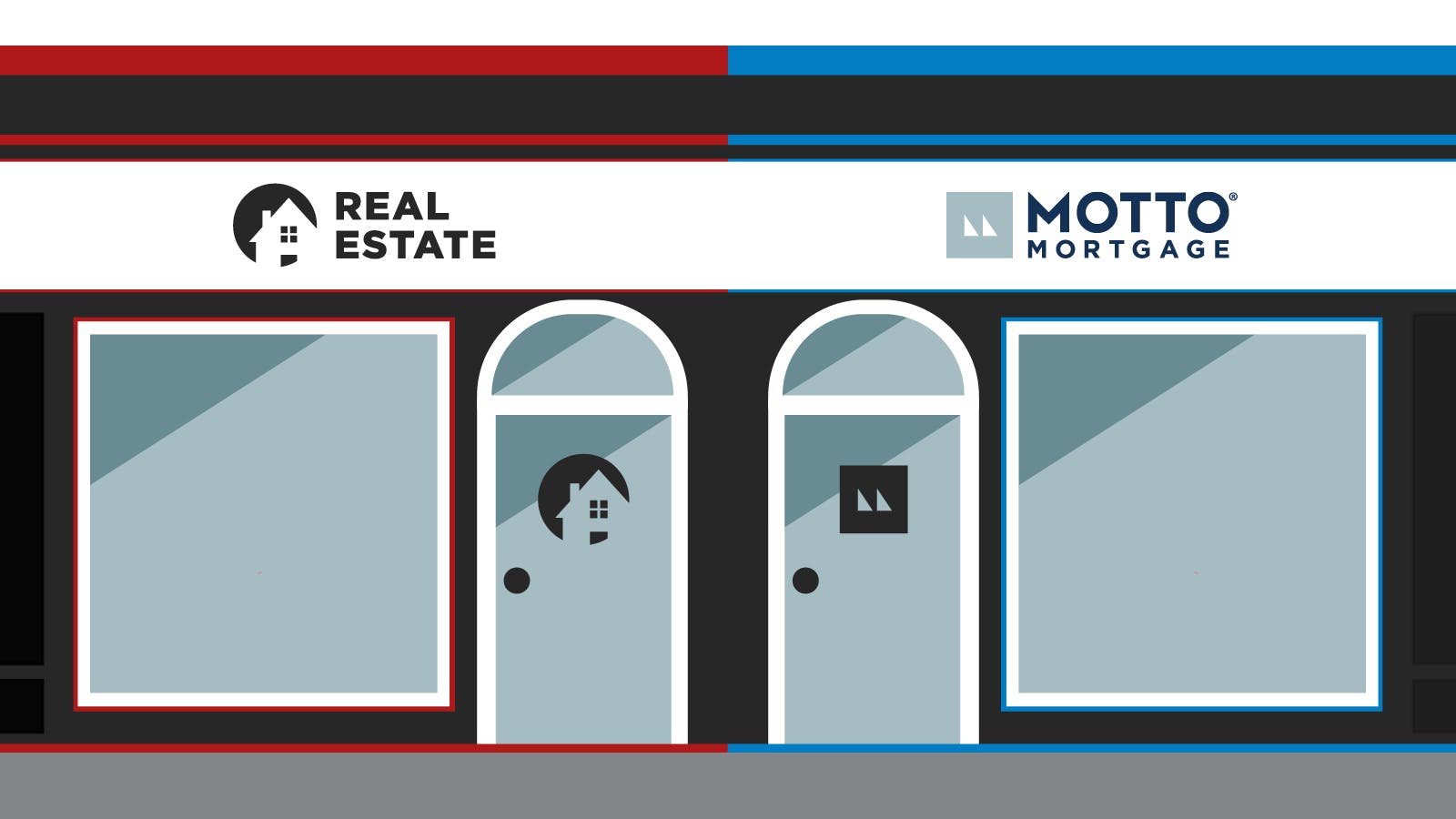Sky high interest rates.
A shrinking housing market.
Frustrated buyers priced out of their neighborhoods.
And more agent competition than ever before.
Anyone else having the occasional Chicken Little moment?
Whether your particular sky is currently falling or not, now might be a great time to take a long, hard look at the value of adding secondary services to your real estate business.
Why, you ask?
Great question!
Secondary Services for Real Estate Brokerages
Diversify, diversify, diversify!
One of the most effective tools tucked into the savvy businessperson’s belt is the art of diversification. The ability to pull revenue from various services that complement your main focus might help stabilize your revenue stream and make it far easier for your business to weather whatever craziness the economic world is currently throwing at you.
Even when your primary business market seems to have completely lost its mind, the chances of every aspect of the real estate ecosystem going haywire at the same time are much less.
Expanding into secondary services might be an effective and organic way to diversify while staying at the center of the market you know and love.
You already know a decent amount about the business end of the secondary services you are currently working with anyway.
Not sure where to start?
Figure out which related industry you want to move into.
Hire some good folks with killer industry experience.
You can even take advantage of turnkey solutions like Motto Franchising’s Mortgage Brokerge-in-a-Box to get your new services off the ground faster. Sure, adding a business always takes some work, but franchise support helps to make it much more manageable.
Cross-pollination, realtor style.
If (when!) you launch a new secondary service, it pretty much comes with a built-in customer base. That’s the whole point.
If a client is coming to you to buy or sell a home, they might be ripe for cross-selling. If they’re buying a home, they might need a mortgage loan. They may need inspection services. If they’re selling, chances are good they’ll need staging.
Whatever they need, you can be right there to offer it to them. Seamlessly.
Remember too that it is easier for you to get additional revenue from a current customer than to try and land a new one.
“In fact, studies suggest that depending on the industry you are in, acquiring a new customer Forbescan cost five to seven times more than retaining an old one.”
Additionally…
“capturly” target=”_blank” rel=”noopener”>According to research, the probability of selling to existing customers is up to 70%, while the probability of selling to new customers is only 5%.”
That is a HUGE difference.
Happy customers might mean more per-customer revenue and less new-customer overhead.
Be the hero
Expanding into secondary services can also help put you, the brokerage, at the heart of every deal. Not only do you now have an opportunity to gain the revenue you were previously giving away to other businesses, but you also may be able to control more parts of the process.
This can be critical, especially if you have built your business reputation around providing awesome customer service.
Imagine having spent all the time and effort to court a new client and make sure they had the best possible experience with your real estate brokerage. You turn this happy and excited customer over to an unrelated mortgage company and…
They completely blow it.
Outside mortgage professionals have even been known to ghost homebuyers when things got sticky or hard.
Sooooo not okay.
Now you have a frustrated, unhappy client whose whole real estate transaction experience has become tainted. Even if their poor experience had nothing to do with your services, sometimes you just can’t escape the collateral damage.
But…
Say you have an in-house mortgage brokerage. You may be able to control the whole process and the whole customer experience from end to end.
The vast majority of us regular folks are overworked, overwhelmed, and underwater. Any time you can simplify a complex process for someone, or make it so they only have to deal with one touchpoint to take care of all their needs…
Boom. New best friend EVER.
Christian Bennett, Co-owner of RE/MAX Champions, sums it up this way:
“The one-stop shop model has been pivotal – not only for the experiences of our clients but also for the culture between our real estate agents and mortgage professionals.” – RISMedia’s Real Estate” target=”_blank” rel=”noopener”>RISMedia
Remember too that buying a home is the largest purchase/investment most people will make in their lifetimes. If you can help them feel that they’ve made a smart choice…
They’ll look at you like you just popped out of a phone booth in a bodysuit and a cape.
A happy client may mean referrals, great word of mouth, stellar Google reviews, and revenue reports that practically light themselves on fire.

Share!
Getting a secondary service off the ground can be one of the most economical ways to expand your business.
You’ve already developed infrastructure for your current business, most likely including office space. You’ve hired administrative staff that can now be cross-trained and shared between businesses as long as each business pays its proportional share. Starting up a related secondary service can be one of the most operationally efficient and cost-effective ways to launch a new business venture.
Your marketing can now also do double duty. With proportional allocation to each entity, integrated strategies can promote all of your various services in the same campaign, stretching your marketing dollars even more.
Integrated marketing can even boost your overall brand recognition. More eyeballs in more markets may mean more name recognition over time.
Besides, potential customers often perceive brokerages that provide integrated services as more professional and capable.
Um, yes, please.
You may also now have access to even more client data, making it easier to identify trends, focus your marketing and personalize your services. The ability to track client preferences and behavior across multiple services can lead to deeper insights, more trend awareness, and greater client engagement.
Be more things to more people
The modern real estate market may mean more diverse needs by more diverse people. Your clientele can range from starry-eyed first-time homebuyers to more experienced seasoned investors.
Offering secondary services may be able to expand your ability to serve whoever walks through your door regardless of their needs or experience level. Creative solutions have gained more and more traction in the post-pandemic world, so why not be nimble enough to offer a broader range of options? These days, one size may not fit all.
“While the current economy continues to be unpredictable, the American dream of home ownership remains strong. Add that … to the introduction of expanded home financing options through unconventional mortgage loans and the real estate horizon looks much more promising.” RISMedia Real Estate
Want to stand apart from your competition? Offer things they can’t! As the real estate market becomes increasingly crowded, offering secondary services under the same roof may give your brokerage a critical edge over the guy down the street.
In the chaos of modern life, one-stop shopping can be a retail holy grail for frazzled consumers.
What kind of secondary service opportunities are out there, you ask?
Well…
Mortgage Brokering
This may be the big tamale. The top dog. The headliner, as it were.
Adding a mortgage brokerage could be one of the most natural fits with a real estate business, and the next logical step in the client’s journey after the real estate agent’s job is done. Sometimes the mortgage professional and the real estate agent are actually working in tandem to make sure an eager homebuyer is prequalified and ready to pounce as soon as the right property comes along.
With Motto Mortgage offering mortgage brokerage franchises, it is also potentially the easiest secondary service to add.
As Kelly Gill, Motto Franchising’s SVP of marketing and strategy, says, “We’ve created an opportunity for real estate brokerages to align with a mortgage solution that shares their culture, relationships, and values. This approach brings a new kind of synergy to the customer experience and a new market advantage to the entrepreneur.”
Under the mortgage broker umbrella, there are several other options for service expansion in addition to bread-and-butter mortgage brokering:
Mortgage servicing: This is the branch that handles mortgage payments, escrow accounts, and regulatory compliance. Mortgage servicers are the ones who make sure the mortgage payment process is smooth and (relatively) painless for everyone involved.
Underwriting: Underwriters assess the risk associated with lending the new homeowner a pile of cash. Their superpower is that they can sometimes even increase accessibility to mortgage loans, especially for first-time homebuyers.
Mortgage insurance: Mortgage insurance protects lenders against borrowers skipping out or no longer making their monthly payments. Once they’re protected, lenders are then usually willing to allow more borrowers to qualify for loans with potentially lower down payments.
Compliance management: Compliance managers can protect brokerages from paying costly penalties, while at the same time protecting consumers from predatory lending practices. The world of real estate/mortgage regulations is complex, so having someone down the hall who lives and breathes this stuff can make everyone’s lives easier.
Mortgage quality control: Send in the auditors! This is where a loan is checked and verified for accuracy and adherence to guidelines.
Default management: Unfortunately, defaults do happen. When a loan is headed down the default road, default managers do their best to mitigate losses for the lender and provide potential foreclosure avoidance options for the borrower.
All that said, a mortgage brokerage is definitely not the only option for those looking to diversify.
Title and Escrow services
Title companies are an important part of real estate and mortgage transactions – they verify the legal ownership of a property including uncovering any liens or disputes that might snarl the transaction. They can protect both the lender and the buyer/borrower from surprise legal challenges that rear ugly heads after the deal is done.
Escrow services may be equally important. Most borrowers prefer (or are required by their lender) to roll the costs of their property taxes and mandatory homeowners insurance into their mortgage payments. They’re used to paying the mortgage every month. It can be a lot harder in the chaos of life to remember to set aside enough to pay a lump sum of money when those bills come due.
Costs can also fluctuate, so it’s up to the escrow folks to adjust mortgage payments accordingly so that tax and insurance bills are paid accurately and on time. They take on the brain damage of figuring all of this out so your customers don’t have to.
Home inspection services
It’s the inspector’s job to root out significant unseen or unknown problems with a property before the sale is finalized. They can find building code violations, problematic areas that need fixing, potential problems… things the buyer should be aware of before signing on the dotted line.
Inspection reports give buyers the ability to go back to the seller and try to negotiate any work or remediation that needs to be done. Or, at least, ask questions about the home’s history and what previous issues might have been addressed before the final deal is inked.
Appraisal services
Appraisals provide a neutral assessment of a property’s market value. They can ensure that neither the lender nor the buyer is overpaying for a property with a… shall we say… “embellished” value.
The appraisal can also be used to determine current property taxes – a key element of the buyer’s final mortgage payment calculation. As much as a buyer may want to understate the home’s assets to lower their property tax bill, they may end up on the hook for back taxes when the appraisal is eventually updated. With interest.
Property management
If your client is an investor or landlord, property management services can be the “boots on the ground” when the owner isn’t available or able to manage the property themselves. The manager’s responsibilities can run the gamut from tenant screening and rent collection to maintenance and move-out assessments.
They can be indispensable to an investment property owner, especially if the owner is not local or unable to visit the property regularly. Solid property management even has the potential to increase rental property ROI by heading off minor issues before they can become major headaches.
Reputation, especially in the world of Yelp and Google reviews, can be everything.
Staging and interior design
The reality of buyer decisions is that they are almost always made by the heart and merely justified by the head. I would be willing to bet you’ve heard “I just fell in love with it!” waaaay more times than “We’ll take it because this is the economically practical choice.”
So when a prospective buyer walks into a house and immediately can see themselves living there, or are wowed by the chic, modern, or homey vibe, chances are high that you’re about to land a sale.
How can a realtor maximize this reaction? With savvy staging from an experienced interior designer. Modern staging has risen to the level of an art form – it’s no surprise that well-staged properties can sell faster and for more than homes that have not been thoughtfully staged.
Moving services
After the contracts have been signed, hands have been shaken and keys have been awarded, it’s time for the buyer to make his new house a home and the seller may also be moving to their new home, as well.
However, even through this happy and exciting time, moving is often cited as one of life’s most stressful events.
And for good reason!
A reputable moving company can ease these anxieties, ensuring that cherished possessions arrive at their new home safe and sound. They can deal with heavy and awkward items, take fewer trips back and forth, and save exhausted homeowners from days of solid, hard labor.
The real estate brokerage has potentially been with the customer for the vast majority of the process by now… why not see it through to the very end?
The real estate ecosystem is a complex web of primary and secondary services, each designed to play a role in supporting a successful transaction for the agent, seller, buyer, and lender.
For the real estate brokerage, they may also provide invaluable pathways to diversification, additional potential revenue streams, and stronger business growth at a lower overall cost. Looking for differentiation from your competitors? They’ve got your back on that too.
So, the sky is falling, huh?
Maybe, with a little help from a new secondary service arm of your brokerage, you can launch that sky right back up where it belongs.
And announce that Chicken Little has left the building.
Published on August 15, 2024


